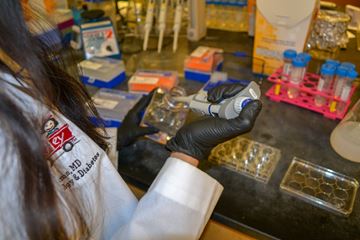Conducting research is an important part of fellowship training. It allows the fellow to develop critical thinking skills that carry over into clinical practice. It also provides background that allows physicians to better interpret clinical, translational, and basic science research papers that they will encounter throughout their careers.
Although some incoming fellows have a strong research background, most have only a small amount of experience. The program directors do not expect trainees to come to the program with a specific research question in mind. Early in their 1st year, fellows meet with the program directors to discuss their general interests and goals. An established timeline integrates clinical duties with the important task of identifying a research mentor and project. This positions fellows to hit the ground running as their 1st year winds down so that they can complete their research projects by the end of training.
Fellows in the IUSM pediatric endocrinology program have a history of strong research accomplishments. In the last 10 years, fellows have presented an average of 5.4 abstracts at national meetings and have published an average of 6.8 research papers, review articles, or book chapters.
Research Education
The Morris Green Physician Scientist Development Program identifies and supports pediatric residents and fellows who want to develop careers as pediatric researchers, physician-scientists and future academic leaders. The program provides protected research time, a structured research curriculum, mentorship and research project funding.
 Research Facilities
Research Facilities
The internationally recognized Herman B Wells Center for Pediatric Research investigates the causes and mechanisms of pediatric disease and develops innovative approaches for diagnosis and treatment. Education of the next generation of basic and translational scientists is one of the core missions of the Wells Center, with faculty mentoring young physicians in grant writing, research planning, manuscript writing and presentation delivery.
The Indiana Clinical and Translational Science Institute is an NIH-funded program that provides research resources, including the Children’s Clinical Research Center contained within Riley Hospital and the Translational Research Laboratory. Additionally, the CTSI has a series of protocol development teams to help design high quality clinical research projects.
